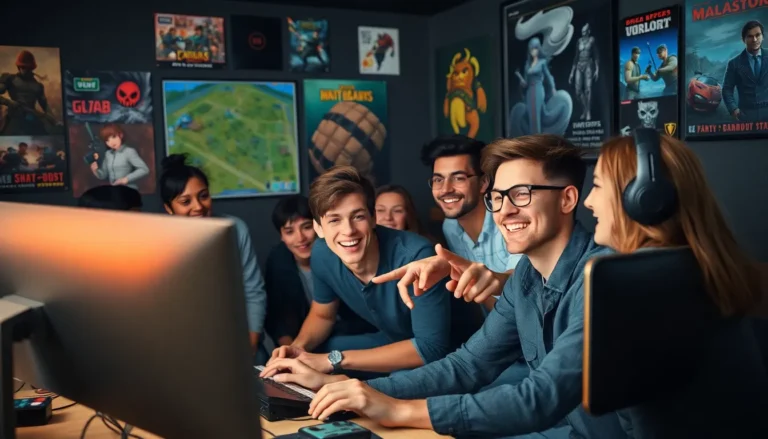Education isn’t just about textbooks and classrooms; it’s a dynamic journey shaped by visionaries who dared to think differently. These education pioneers broke the mold, challenging the status quo and transforming the way knowledge is shared. From inventing innovative teaching methods to advocating for accessible education, they’ve paved the way for generations to come.
Table of Contents
ToggleOverview of Education Pioneers
Education pioneers altered the landscape of learning through innovative practices and philosophies. Figures such as John Dewey championed experiential learning, emphasizing the importance of students engaging directly with their environment. Maria Montessori introduced a child-centered approach, promoting independence and hands-on activities that cater to individual learning styles.
Individuals like Paulo Freire popularized critical pedagogy, encouraging learners to engage with societal issues through dialogue and reflection. Freire’s work specifically focused on education as a tool for social change, aiming to empower marginalized communities. Likewise, Booker T. Washington emphasized vocational training, advocating for practical skills to uplift African Americans in the post-Civil War era.
In addition, innovators like Sir Ken Robinson have argued for creativity in education. Robinson highlighted the need for curriculum reforms that foster creativity over standardized testing, arguing that true intelligence comes in a variety of forms. They all contributed significantly, each leaving a profound impact on teaching methods and educational accessibility.
Innovators in technology, such as Salman Khan, established platforms like Khan Academy, making quality instruction widely available. His model of online learning democratizes education, allowing students anywhere to access resources at their own pace. Ultimately, these pioneers collectively transformed education into a more inclusive and diverse field, setting the stage for ongoing advancements that adapt to the needs of society.
Key Figures in Education Reform
Education reform has seen many influential figures who reshaped learning’s landscape. Pioneers like John Dewey and Maria Montessori championed innovative approaches, leaving lasting impacts.
John Dewey and Progressive Education
John Dewey advocated for progressive education, emphasizing the importance of experiential learning. He believed students should engage with real-life situations instead of relying solely on textbooks. Learning through experience not only fosters critical thinking but also prepares students for active citizenship. His work influenced educational policies that promote collaborative learning environments. Dewey’s ideas encourage educators to design curricula that connect academic content to students’ lives, ultimately creating a more engaging learning experience.
Maria Montessori and Child-Centered Learning
Maria Montessori revolutionized education with her child-centered learning approach. This method promotes independence, allowing children to learn at their own pace in a prepared environment. Montessori classrooms feature hands-on materials that cater to diverse learning styles and interests. Emphasizing observation, teachers guide rather than dictate, fostering self-directed exploration. Montessori’s philosophy has inspired schools worldwide, showcasing the effectiveness of tailored education that respects individual needs. Through her innovative practices, Montessori laid the groundwork for modern educational strategies that prioritize student engagement and development.
Impact of Education Pioneers
Education pioneers significantly reshaped how learning occurs. Their innovative approaches led to profound changes in classrooms and curricula.
Changes in Teaching Methodologies
Experiential learning emerged as a key methodology because of John Dewey. This approach encourages students to engage actively with real-world scenarios. Montessori’s child-centered model also transformed classrooms, allowing students to choose activities that matched their interests. This promotes independence and supports different learning styles. Paulo Freire’s critical pedagogy shifted focus towards dialogue and social awareness. Teachers now prioritize fostering critical thinking, empowering students to challenge societal norms. In recent years, the rise of technology has further changed methodologies, with online platforms providing diverse learning opportunities. This shift results in an education system that adapts to various needs and preferences.
Influence on Modern Curriculum Development
Modern curricula reflect the philosophies of numerous education pioneers. John Dewey’s emphasis on critical thinking led to the integration of problem-solving exercises in educational frameworks. The Montessori method’s focus on self-directed learning encourages schools to offer personalized learning paths. In vocational training, Booker T. Washington’s teachings initiated programs designed to enhance practical skills, meeting labor market demands. Sir Ken Robinson’s advocacy for creativity resulted in incorporating arts and innovation into curricula. Furthermore, Salman Khan’s Khan Academy democratized learning by making high-quality resources freely available online. This evolution in curriculum development promotes an inclusive, adaptive educational landscape.
Recognition and Legacy
Education pioneers have received numerous accolades and left lasting legacies. Their groundbreaking contributions continue to resonate within the educational landscape.
Awards and Honors
John Dewey’s impact earned him prestigious awards such as the Order of the Founder from the National Society for the Study of Education. Maria Montessori, recognized internationally, was nominated for the Nobel Peace Prize multiple times for her work in child education. Paulo Freire received countless accolades for his advocacy in social justice and education, including the UNESCO Literacy Prize. Booker T. Washington’s lifelong dedication to education led to honors such as the Spingarn Medal from the NAACP. Sir Ken Robinson’s popular TED Talks garnered millions of views, further solidifying his influence in contemporary educational discourse. These recognitions highlight the importance of their innovations in shaping modern education.
Ongoing Influence in Education Today
Educational philosophies established by these pioneers endure in current teaching practices. Dewey’s emphasis on experiential learning manifests in project-based curricula, fostering critical thinking. Montessori’s principles of child-centered learning continue to shape early childhood education programs, promoting individualized instruction. Freire’s focus on dialogue and empowerment influences educators advocating for social justice within classrooms. The vocational training advocated by Washington remains vital, particularly in technical education programs designed for workforce readiness. Innovators like Salman Khan demonstrate the ongoing evolution of digital education, creating accessible resources globally. Each pioneer’s legacy fosters a more inclusive and adaptive educational environment, ensuring that learning evolves alongside societal changes.
Education pioneers have undeniably reshaped the landscape of learning. Their innovative approaches and philosophies continue to inspire educators and students alike. By challenging traditional methods and advocating for accessible education, they’ve laid the groundwork for a more inclusive and adaptive educational system.
As society evolves, the principles established by these visionaries remain relevant. Their legacies encourage ongoing dialogue about teaching practices and the importance of critical thinking. The impact of their work is evident in modern curricula and educational technologies, ensuring that learning remains dynamic and responsive to the needs of future generations.


